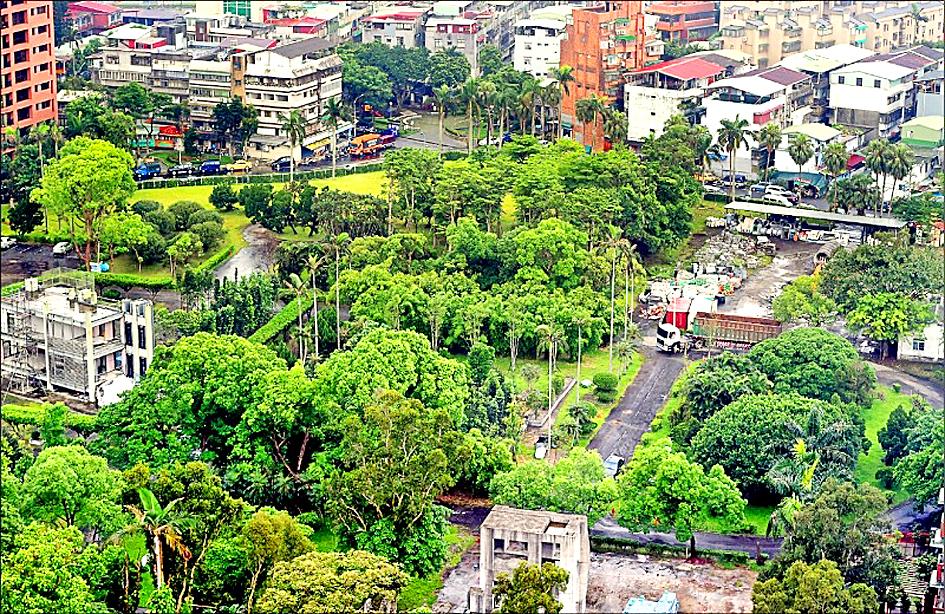The Chinese Nationalist Party (KMT) yesterday accused the administration of President Tsai Ing-wen (蔡英文) of overseeing a “witch hunt” against its opponents, after the Ill-gotten Party Assets Settlement Committee requested materials from the party for an investigation into the controversial sale of the Zhongxing Shanzhuang (中興山莊) plot.
In 2005, developer Yuanlih Group bought parcels of the land, which houses the KMT’s Institute of Revolutionary Practice, from the party for NT$3.83 billion (US$127.63 million at the current exchange rate), with the aim of building a residential high-rise.
KMT Administration and Management Committee director Chiu Da-chan (邱大展) said that after receiving the committee’s request to review its files, the KMT opened its doors, as it has nothing to hide.

Photo: Chen Yu-fu, Taipei Times
However, he called the request “foul play” and described it as nothing more than a “political maneuver.”
The Ill-gotten Party Assets Settlement Committee demanded to review files related to the party’s annual income and expenditure, as well as meeting minutes from the 1950s and 1960s, as part of the probe into whether the KMT illegally acquired the plot in Taipei’s Wenshan District (文山).
The legality of the sale was questioned after Yeh Sung-jen (葉頌仁), whose father owned four parcels of the land, sought a ruling from the committee after he failed to convince a court that KMT officials forced his father to sell them the land in 1962.
The committee asked the Taipei City Government not to issue the developer a construction permit due to the controversy, but in July last year it did so anyway as part of urban renewal efforts.
Chiu said that despite the Supreme Court in 2011 ruling that there was no coercion involved when the KMT purchased the land from Yeh’s father, the committee has continued with the probe, holding two hearings in 2017 and another last month.
Besides trying to smear the KMT, the committee is seeking evidence so that it can retaliate against Taipei Mayor Ko Wen-je (柯文哲), who approved the construction permit, he said.
It is “regrettable” to see the lengths to which the committee is willing to go to take down its enemies, he added.
“If that is not a witch hunt, then I do not know what is,” Chiu said.
Committee spokesman Sun Pin (孫斌) urged the KMT not to politicize the probe, saying that the committee made the request after the party sent the committee a letter welcoming it to view the files.
Additional reporting by Lee Hsin-fang and CNA

Taiwan would welcome the return of Honduras as a diplomatic ally if its next president decides to make such a move, Minister of Foreign Affairs Lin Chia-lung (林佳龍) said yesterday. “Of course, we would welcome Honduras if they want to restore diplomatic ties with Taiwan after their elections,” Lin said at a meeting of the legislature’s Foreign Affairs and National Defense Committee, when asked to comment on statements made by two of the three Honduran presidential candidates during the presidential campaign in the Central American country. Taiwan is paying close attention to the region as a whole in the wake of a

President William Lai (賴清德) has appointed former vice president Chen Chien-jen (陳建仁) to attend the late Pope Francis’ funeral at the Vatican City on Saturday on his behalf, the Ministry of Foreign Affairs said today. The Holy See announced Francis’ funeral would take place on Saturday at 10am in St Peter’s Square. The ministry expressed condolences over Francis’ passing and said that Chen would represent Taiwan at the funeral and offer condolences in person. Taiwan and the Vatican have a long-standing and close diplomatic relationship, the ministry said. Both sides agreed to have Chen represent Taiwan at the funeral, given his Catholic identity and

Lawmakers from the Democratic Progressive Party (DPP) yesterday established a friendship group with their counterparts in Ukraine to promote parliamentary exchanges between the two countries. A ceremony in Taipei for the Taiwan-Ukraine Parliamentary Friendship Association, initiated by DPP Legislator Chen Kuan-ting (陳冠廷), was attended by lawmakers and officials, including Deputy Minister of Foreign Affairs Francois Wu (吳志中) and European Economic and Trade Office in Taiwan Director Lutz Gullner. The increasingly dire situation in Ukraine is a global concern, and Taiwan cannot turn its back when the latter is in need of help, as the two countries share many common values and interests,

Chinese Nationalist Party (KMT) Chairman Eric Chu (朱立倫), spokeswoman Yang Chih-yu (楊智伃) and Legislator Hsieh Lung-chieh (謝龍介) would be summoned by police for questioning for leading an illegal assembly on Thursday evening last week, Minister of the Interior Liu Shyh-fang (劉世芳) said today. The three KMT officials led an assembly outside the Taipei City Prosecutors’ Office, a restricted area where public assembly is not allowed, protesting the questioning of several KMT staff and searches of KMT headquarters and offices in a recall petition forgery case. Chu, Yang and Hsieh are all suspected of contravening the Assembly and Parade Act (集會遊行法) by holding